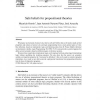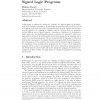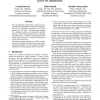136
click to vote
AMAI
2004
Springer
15 years 1 months ago
2004
Springer
We present systems of logic programming agents (LPAS) to model the interactions between decision-makers while evolving to a conclusion. Such a system consists of a number of agents...
120
click to vote
APAL
2005
15 years 1 months ago
2005
We propose an extension of answer sets, that we call safe beliefs, that can be used to study several properties and notions of answer sets and logic programming from a more genera...
134
click to vote
CORR
2010
Springer
15 years 2 months ago
2010
Springer
This paper develops automated testing and debugging techniques for answer set solver development. We describe a flexible grammar-based black-box ASP fuzz testing tool which is abl...
143
click to vote
AMAI
2008
Springer
15 years 2 months ago
2008
Springer
We introduce a knowledge representation language AC(C) extending the syntax and semantics of ASP and CR-Prolog, give some examples of its use, and present an algorithm, ACsolver, ...
119
click to vote
SLP
1994
15 years 3 months ago
1994
In this paper we explore the notion of a \signing" of a logic program, in the framework of the answer set semantics. In particular, we generalize and extend the notion of a s...
125
click to vote
IJCAI
2003
15 years 3 months ago
2003
We investigate the combination of answer set programming and qualitative optimization techniques. Answer set optimization programs (ASO programs) have two parts. The generating pr...
111
click to vote
IJCAI
2001
15 years 3 months ago
2001
We give a graph theoretical characterization of answer sets of normal logic programs. We show that there is a one-to-one correspondence between answer sets and a special, non-stan...
148
click to vote
LANMR
2004
15 years 3 months ago
2004
In previous work we have discussed the importance of identifying the cycles that occur in a logic program under the answer set semantics, and the connections between cycles, that w...
157
click to vote
CLIMA
2006
15 years 3 months ago
2006
It is recognised that institutions are potentially powerful means for making agent interactions effective and efficient, but institutions will only really be useful when, as in oth...
110
click to vote
AAAI
2004
15 years 3 months ago
2004
In this paper we introduce the language Golog+HTNT I for specifying control using procedural and HTN-based constructs together with deadlines and time restrictions. Our language s...



